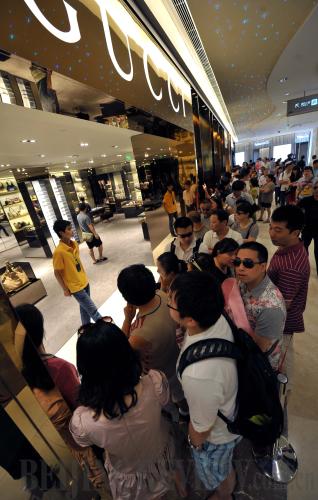|
 |
|
DUTY FREE: Thanks to the new policy, airport shops in south China's Hainan Province are crowded with eager domestic consumers (XINHUA) |
Liquor Bill Scandal
The China Petrochemical Corp. (Sinopec Group), one of China's State-owned petroleum giants, ordered the former general manager of the group's Guangdong branch Lu Guangyu to pay 131,100 yuan ($20,100) for liquor he had consumed for his own sake and later demoted him, after his extravagant alcohol purchasing bills were posted online.
Among the types of alcohol Lu bought were Moutai, one of the most famous and expensive liquor brands in China, together with high-end imported wine.
Rapid economic growth has brought cars into Chinese families. Sinopec and a few other monopolies are the only gasoline suppliers to Chinese car owners. The consumers cannot accept the liquor bill scandal. They believe these state-owned giants should hand more revenues to the state treasury.
Slack supervision is actually encouraging these greedy company managers to do whatever they want. Sinopec must give the public an acceptable answer on this scandal.
The Beijing News
Duty-Free Island
China's island province Hainan has adopted an "offshore duty-free" policy that allows domestic tourists to purchase certain items on the island without taxation.The policy is attractive, but after all only middle- and high-income earners can afford the trip to Hainan, and what is displayed in duty-free shops are mostly luxury commodities.Compared with high-income earners, their low-income peers need more favorable policies, and lower taxes should be levied on ordinary commodities. Unfortunately, the offshore duty-free policy goes against this principle. It's better to implement tax breaks or exemption on ordinary commodities in as many places as possible than to only preserve it to luxury commodities in a special zone. Due to excessive taxation, many Chinese choose to go on shopping outside the nation. Thus, to an extent, the offshore duty-free policy means to boost domestic demand and promote domestic economic development. While the people have money to save from duty-free commodities, the country's economic progress gains speed, too. Here the key is whether the government would like to sacrifice some immediate interests for bigger and long-term interests. Since Hainan can afford tax exemption for commodities for the sake of the island's overall economic growth, why can't the government extend this policy to more commodities in more extensive areas to benefit more people?
Guangzhou Daily
Transparent Expenses
On April 14, China's Ministry of Science and Technology announced to the public its total expenses on officials' cars, public relations expenditure and overseas visits in 2011, which amounted to 40.18 million yuan ($5.91 million).
The ministry's publishing of these expenses breaks relevant "technical bottlenecks" of the fiscal transparency program, which have been taken as excuses by so many central and local departments. Whether these departments want to publish its expenses for these categories or not is only a prelude to whether complete fiscal transparency can be realized.
Exposure is not the final goal, but a road toward a healthy system that brings the government's expenses under supervision. The public may not find it easy to understand the professional terms on the fiscal forms. Since it has decided to publish the financial information, the government should make it understandable to the public, so they give comments and may contribute suggestions.
To expose the expenses for officials' cars, public-relations expenditure and overseas visits does not necessarily mean fairness and justice. So when the government means to present a transparent image to the public, it must also make the fiscal information on these categories understandable, so the public would find it credible.
Xinhua Daily Telegraph
Consumer Confidence
As the nation is moving to contain price rises for commodities, foreign brands of milk powder have even wound up their prices in China. Ausnutria and Nestle raised their prices and other foreign milk powder brands are also exploring price rises.
Most foreign dairy companies have cited rising raw materials costs as the main reason behind price hikes, but experts say they believe it is because these foreign brands have mastered the pricing power of the domestic high-end milk market.
Besides, insiders say that frequent scandals in the home dairy industry in recent years have heavily hit consumer confidence in domestic milk. So foreign milk powder has become a natural choice for consumers.
In March, a report released by the General Administration of Customs showed more than 80 percent of consumers surveyed said they believed foreign dairy brands were of better quality than domestic ones. Most consumers choose to buy imported milk powder, resulting in high demand for imported dairy products.
In order to boost consumer confidence, domestic milk producers should continue to improve quality.
Xi'an Evening News | 